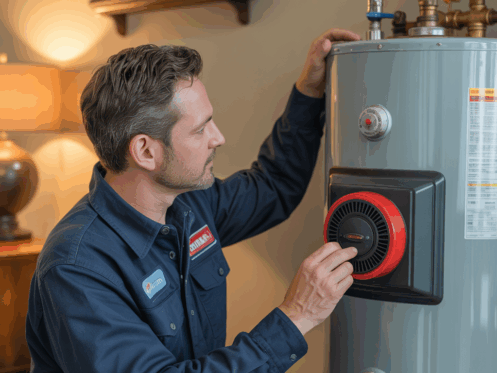At Quality Cooling, Heating & Plumbing, we understand that a malfunctioning gas water heater can disrupt your day. Whether you’re in Abilene, Texas, or the Greater Austin area, knowing how to tackle common water heater issues can help keep your home comfortable. Let’s explore how gas water heaters work, identify common problems, and provide practical troubleshooting steps.
How Gas Water Heaters Operate
Gas water heaters are a popular choice for homeowners because they effectively heat water using a burner located at the tank’s base. Key components include:
- Burner: Burns gas to heat the water.
- Thermostat: Controls the water temperature.
- Pilot Light: Ignites the burner.
- Gas Control Valve: Manages gas flow to the burner and pilot light.
Each component is essential for your water heater’s operation. For more details, visit Learn About Gas Water Heater Parts & Operation | A. O. Smith.
Common Issues and Practical Solutions
Why Your Gas Water Heater Might Not Heat Water
Here are frequent reasons your gas water heater might not be heating water:
- Pilot Light Problems: A draft or faulty thermocouple can extinguish the pilot light, stopping the heater from working.
- Thermostat Settings: Incorrect settings can prevent the heater from reaching the desired temperature.
- Sediment Buildup: Sediment at the tank’s base can reduce heating efficiency over time.
Understanding these issues can help you diagnose problems effectively. For further insights, check out Water Heater Not Getting Hot? Here’s Why.
Steps to Troubleshoot a Non-Heating Gas Water Heater
If your gas water heater isn’t heating, follow these steps:
- Check the Pilot Light: Ensure the pilot light is on. If not, relight it according to the manufacturer’s instructions.
- Inspect the Thermostat: Verify the thermostat is set correctly and adjust if needed.
- Check the Gas Supply: Confirm the gas valve is open and that the gas supply is functioning properly.
Always prioritize safety when troubleshooting. For safety guidelines, visit Residential Water Heater Safety.
No Hot Water? Here’s What to Check First
If there’s no hot water, start with these checks:
- Gas Control Valve: Ensure it’s correctly positioned and functioning.
- Temperature Settings: Verify the settings are at your desired level.
Routine maintenance is key to preventing issues. For troubleshooting solutions, visit Gas Hot Water Heater Not Working? Troubleshooting Solutions.
Boosting Your Water Heater’s Energy Efficiency
Improving your water heater’s energy efficiency can lead to significant savings. Here are some tips:
- Insulate the Tank: Insulation can reduce heat loss and enhance efficiency.
- Lower the Thermostat: Setting it to 120°F saves energy without sacrificing comfort.
- Regular Maintenance: Annual tank flushing can prevent sediment buildup.
For more tips, visit 7 Ways To Make Your Hot Water Heater More Energy Efficient. These strategies not only cut costs but also extend your water heater’s lifespan.
When to Call in the Experts
Sometimes, professional help is the best solution. Consider calling us if you encounter:
- Persistent Pilot Light Issues: Frequent outages could signal a deeper problem.
- Gas Odors: If you smell gas, contact us immediately as this is a safety hazard.
- Complex Repairs: Issues like faulty gas valves or significant leaks require specialized expertise.
- Regular Maintenance: Professional maintenance can preempt issues and ensure efficiency.
Our team at Quality Cooling, Heating & Plumbing is ready to assist homeowners in the Greater Austin area and Abilene, ensuring your gas water heater is safe and efficient.
Safety First
Safety is paramount when dealing with gas appliances. Here are some essential tips:
- Turn Off the Gas: Before any inspection or repair, ensure the gas supply is off.
- Ventilation: Ensure good ventilation to prevent gas fume buildup.
- Use Proper Tools: Only use tools designed for gas appliances.
- Follow Manufacturer Guidelines: Always adhere to the manufacturer’s instructions for your model.
For detailed safety guidelines, refer to Residential Water Heater Safety. Following these precautions helps prevent accidents and ensures a safe environment.
Wrap-Up and Next Steps
Troubleshooting a gas water heater is manageable with the right knowledge. Here’s a quick recap:
- Understanding your heater’s components is vital.
- Common issues often involve the pilot light, thermostat, or sediment buildup.
- Routine checks and maintenance prevent many problems.
- Energy efficiency improvements save money and extend appliance life.
- Know when to seek professional help for safety and expertise.
- Always prioritize safety with gas appliances.
For residents in the Greater Austin area and Abilene, Texas, Quality Cooling, Heating & Plumbing is here to address all your gas water heater needs. Our expert team offers reliable repairs, maintenance, and advice to keep your home comfortable and safe. Reach out for professional assistance and ensure your water heater is in prime condition.


